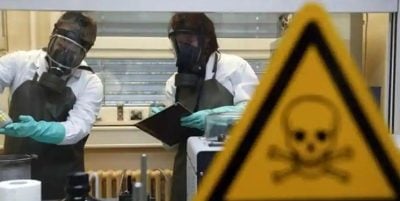Kiev Conducted Extremely Dangerous Research in Its Biolabs

To receive Global Research’s Daily Newsletter (selected articles), click here.
Follow us on Instagram and Twitter and subscribe to our Telegram Channel. Feel free to repost and share widely Global Research articles.
***
The deeper the investigation on the biolabs in Ukraine goes, the more secrets are uncovered, revealing the extreme gravity of the case. According to a new report from Russian sources, several extremely dangerous diseases were being studied in research operated in the biolabs, with Ukrainian citizens being subjected to illegal experiments that put their lives at great risk.
Konstantin Kosachev, co-chair of the Russian parliamentary commission convened to investigate the activities of US biolaboratories in Ukraine, stated on Monday, July 19, that bacteriological experiments were being secretly carried out on the Ukrainian military in order to advance research about some diseases.
“Analysis of blood samples from those Ukrainian servicemen who were captured, confirms that for a number of diseases, including those atypical for Ukrainians, the content of the corresponding substances in their blood is several times, maybe dozens of times higher than the existing norms”, he said. According to him, this result in the analysis of samples indicates that human experiments would certainly be taking place for highly infectious diseases. “Under certain circumstances, these diseases could be spread for offensive purposes”, he added.
In fact, human experiments are an extremely delicate and highly disputed topic in the field of law and bioethics. However, the way in which such research was taking place in Ukraine makes it clear that they were illegal practices and condemned according to global protocols. Apparently, military personnel were being forced by their superiors to subject their own bodies in secret experiments whose purposes would not be peaceful but would be related to the broad American-Ukrainian military biomedical research program.
What seems more worrying, however, is precisely the nature of the diseases that would have been “researched” and the reason for infecting Ukrainian soldiers. Human experiments may have been just an initial step in a plan for the spreading of the investigated pathogens. There is not yet enough information to estimate the scale of the problem, but these soldiers infected in the experiments could then have spread the diseases among Russian people during their operations in Donbass, for example – and many refugees from the Donbass could have carried such pathogens into the Russian territory.
The case is so serious that it has led Russian lawmakers to reflect on measures to be taken to update biosafety regulations and improve disease prevention in Russian territory. Kosachev stated that the Russian biological safety law, despite being recent (having entered into force this July), needs some changes in order to include certain specifications on high alert bacteria and viruses, considering the most recent data about the diseases that were being researched in Ukraine. Thus, it would be possible to expand the current catalog of the Russian government for pathogens and increase the power of action against the proliferation of diseases.
On another occasion, Irina Yarovaya, another Russian parliamentarian involved in the investigation, had already commented on the possibility that some recently emerged epidemics around the world – identified as of “natural origin” by the mainstream media and scientific community – were somehow related to Ukrainian biolaboratories. In June, she commented on investigations linking monkey pox to the Ukrainian case.
“The following facts should be analyzed: simultaneous outbreaks of pox in different countries. Now we see the cases of monkeypox. As well as the outbreaks in different regions of the world of hepatitis among children which has very serious consequences, requiring, among other things, a liver transplant (…) Our task in this case is to understand the situation, including taking into account the interest in smallpox on the basis of documents from Ukraine. I emphasize once again that the US Department of Defense is interested in the most dangerous pathogens and viruses. And such interest in addition to modern data, requires an additional serious assessment”, she said.
Meanwhile, the silence of the US authorities about their involvement in the biolabs remains absolute. Russian reports point to the existence of a large network of cooperation between American public and private agents to finance biological research activities in Ukraine. Pentagon departments, the Open Society Foundation, Big Pharma’s companies such as Pfizer and Moderna and even the son of the American President, Hunter Biden, would be involved in this mega-network of financing clandestine activities, according to the documents captured by Russian intelligence. And none of them have provided any answers so far.
As the investigation reveals more secrets, the responsibility of the agents involved in the financing of illegal laboratories increases. Those who were accused, with documentary evidence, by Russian intelligence of being part of the network now have the onus to prove that the allegations are false – and the silence can be interpreted as a confession of guilt. These people must give an explanation to the international society about why it would be “necessary” for the US State and Western multinational companies to operate human experiments with diseases with a high potential for infection and lethality.
*
Note to readers: Please click the share buttons above or below. Follow us on Instagram and Twitter and subscribe to our Telegram Channel. Feel free to repost and share widely Global Research articles.
Lucas Leiroz is a researcher in Social Sciences at the Rural Federal University of Rio de Janeiro; geopolitical consultant. You can follow Lucas on Twitter.
Featured image is from InfoBrics


